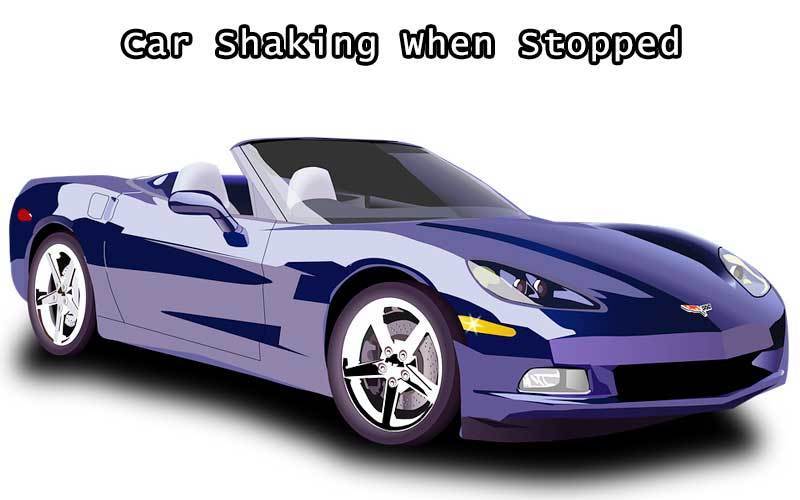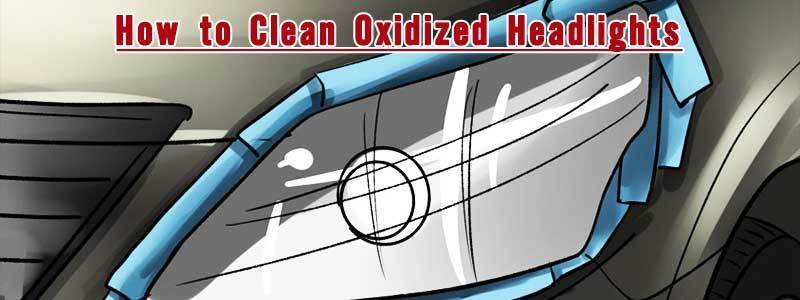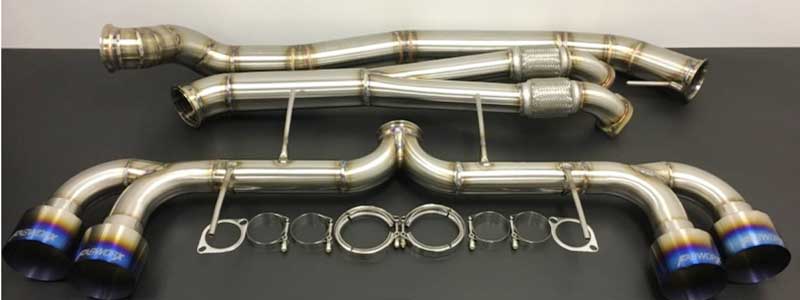Car Shaking When Stopped! 11 Reasons Why Your Car Is Vibrating
Swinging back and forth while sitting on you armchair can be a relaxing experience.
But when you’re sitting on your car, the incidence is far from relaxing. It’s annoying, creepy and honestly, a sign of something going wrong.
Yes, it’s normal to experience optimal vibration when your car is in operation. But when the level goes beyond optimal, such as car shaking when stopped, or idle, you got a concern, my friend.
Some might think the problem is with the engine only. But that’s not the case always. It might have something to do with the engine or the parts associated with it.

In this article, we’ll discuss car shaking problems and how you can address them.
When Is Your Car Shaking?
Finding the problem occurrence time plays a pivotal role in determining the problem itself. There are several times when car vibration can happen. Heck, it can even happen in more than one instances.
- The car shakes when stopped.
- The car is shaking when idle.
- The car shakes when driving slow.
- The car shakes when accelerating.
- The car shakes when braking.
Each timing can represent a different type of problem. However, often the problems are easy to fix. Just knowing the common causes will suffice and help you fix the problem.
11 Common Car Shaking Problems
1. Bad Engine Mount
If the problem doesn’t lie in the engine, then it might have something to do with the setup adjacent to it. The engine mount is what hosts the engine and connect it to the rest of the car. It also transmits the engine power to the body. Sometimes it can be damaged or worn out, lacking the stability to absorb engine vibration.
2. Bent Axles
This one has nothing to do with the engine, rather the axles. Often the instance occurs right after you’ve faced a collision, or drive on bumpy roads. The damage even not be noticeable for bare eyes. As a result, the axles may bend or become damaged. Either way, the vibration will increase as you accelerate.
3. Faulty Fuel Intake System
This occurrence is often seen in old vehicles. After years of use and thousands of miles running, the fuel valve might get weary, or clogged. This results in the insufficient or uneven supply of fuel to the engine. Also, due to the improper adjustment, the fuel-air mixture might get muddled and the engine will start vibrating.
4. Damaged Hose
There are several hoses connected to different vacuum ports of the engine. Their job is to transport and dump exhaust fumes, which are the byproduct gases. They can get loose, broken, leaked or damaged while in use. Vibrating will be least of your problems if that happens. You could experience your engine misfiring, stalling, losing power and even shutting down altogether.
5. Spark Plug Issues
If your car shakes when idle, the issue you need to check first is the spark plugs. Dirty, damaged, worn out spark plugs don’t work properly. As a result, when you start the ignition switch, they cannot ignite the fuel residing on the piston cylinder. Since the fuel-air mixture doesn’t get properly ignited, the engine starts vibrating and misfiring as a result.
6. Improper Timing Belt
Not only this one but the other types like V-belt and serpentine belt can give you a headache too. The belts can be loose or damaged. As a result, the fan rotation and other operations that are dependent on the belt won’t function properly. Not only you’ll experience a vibration, but also an irritating sound will follow. This incident mostly occurs in old or high mileage cars.
7. Brake Problem
If the problem occurs whenever you apply the brake to your car, then it probably has something with your front brake. Why the front brake? Because they usually take the most stress. The pads and the rotors are components of the front disk brake that needs frequent inspection and replacing.
The rotor is the part attached to the car wheel, and the pads push against the rotor to slow down the wheel when the brake is applied. For the belt to work properly, the rotors shouldn’t be twisted, while the pads should remain in a certain thickness.
8. Worn Tires
If you experience shakiness with a certain speed or with a certain interval while driving, this means your tires has been out of balance. They can be worn unevenly due to long usage, in which case one part will be thinner than other parts. Once this happens, you’ll experience more bumping rather than vibration as you accelerate.
9. Wheel Bearing Problems
The wheels are in constant motion, so they can generate a lot of heat. The wheel bearings lubricate the wheels and prevent that from happening. But if they become loose, you’ll find out the car is shaking. However, the matter is graver than you think, as it can throw your vehicle off balance.
10. Bad Propeller Shaft
Rear wheel drive vehicles contain a part named propeller shaft. It transmits power from the engine to the back wheels. If you use such a vehicle and the propeller shaft gets damaged, you’ll experience car shakiness while driving.
11. When Shocks or Struts Not Working Properly
Shocks and struts also can create problems when they not working properly. It also occurs if you can’t connect or change it properly. Details guide of how to change shocks and struts properly available here.
How To Fix Car Shaking Problems?
You’ll be amazed to hear that as severe as these problems might sound, they are actually pretty easy to address. Often they can be solved by yourself without any help. Other times, you might need help from mechanics. Either way, you shouldn’t sit on these problems for long as they can turn into something more serious.
1. Spot The Problem
The gist of the solution lies in determining the problem successfully. You can do this by ‘singling out’ method. You need to observe when this problem happens, how frequently it happens. Does it happen while idle, or all the time the engine is running? Is there any external impactor like extreme weather, bumpy road, etc. influencing the vibration?
2. Analyze The Problem
Different problems can be solved in different ways. Take some time to analyze the problem. Otherwise, you’ll act under the wrong impression and end up spending top dollars for wrong causes.
Not all vibration problems occur due to engine related issue. It can be an axle problem, bearing problem, problem with brakes and even tires. Even for the engine, the problems can show themselves in different appearances.
- A. For instance, if you experience single cylinder misfires, it probably has something to do with fuel ignition or spark plug. So, all you have to do is change the spark plugs and calibrate them properly.
- B. If you find the car misfiring multiple times randomly, the problem is with the engine functions. Check for vacuum pipes, airflow sensor failures or dirty airflow sensor. Check and replace them if needed.
- C. More consistent regular vibrations that happen when the car is idle will indicate the problem has something to do with the engine. Check the engine mount and repair/replace it depending on the level of damage.
- D. If the regular vibrations occur when you’re driving, then the problem resides in issues like loose belts and bent axles. These problems require you to go to experienced mechanics.
- E. If you experience vibrations or thumping in a regular interval while braking or driving, check your brakes and tires. The timing indicates the problem might not be with the engine, but the parts on work at that exact time.
3. Replace/ Repair The Damaged Parts
That’s a tricky decision. Often, you’ll decide to take things on your hands and go with your experience. But you have to understand the limit. There are things like changing spark plugs that you can do on your own easily. As for more sophisticated tasks that require proper tools, it’s better to go to a mechanic.
Considering you won’t go overboard with your guts, we’re stating a few tools that you might need for simpler and regular maintenance tasks.
- A. Car Jack
- B. Screwdriver
- C. Mallet
- D. A-Frame For Engine Pulling
- E. Ratchet Wrench.
What important is always keep checking your car parts and replace them when they wore out. Before you head out for a drive, check if the engine, spark plugs and brakes are working properly. Some things need regular replacement like tires, car belts, brake pads. So make sure you check them out before and after a long driving tour.
Final Words
When it’s your life on the line, you can be anything but reckless.
Car shaking when stopped can seem a normal problem, even ignorable at first. What’s so worrying about a little vibration, you might think. But the truth is this problem can be a forerunner for many major problems. You might even end up spending hundreds and thousands of dollars.
But that’s just money. Ignoring these problems can pose a threat of physical damage to you. A simple vibration when braking can be an indication for major brake failure. So, address the car vibration issues as soon as you notice them.
If you’re a fan of rocking, buy a rocking chair instead. But stay safe when it comes to your car. It deserves your proper attention.
The human body is susceptible to various infections, some of which can be very severe. One of the pressing concerns many have is understanding What is bacterial meningitis and how to avoid it. The answer lies in recognizing it as a bacterial infection of the brain’s protective layers and knowing that staying updated with vaccinations can drastically reduce its risk. https://southwestsurgerylhc.com/what-is-bacterial-meningitis-and-how-to-avoid-it/



